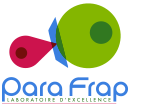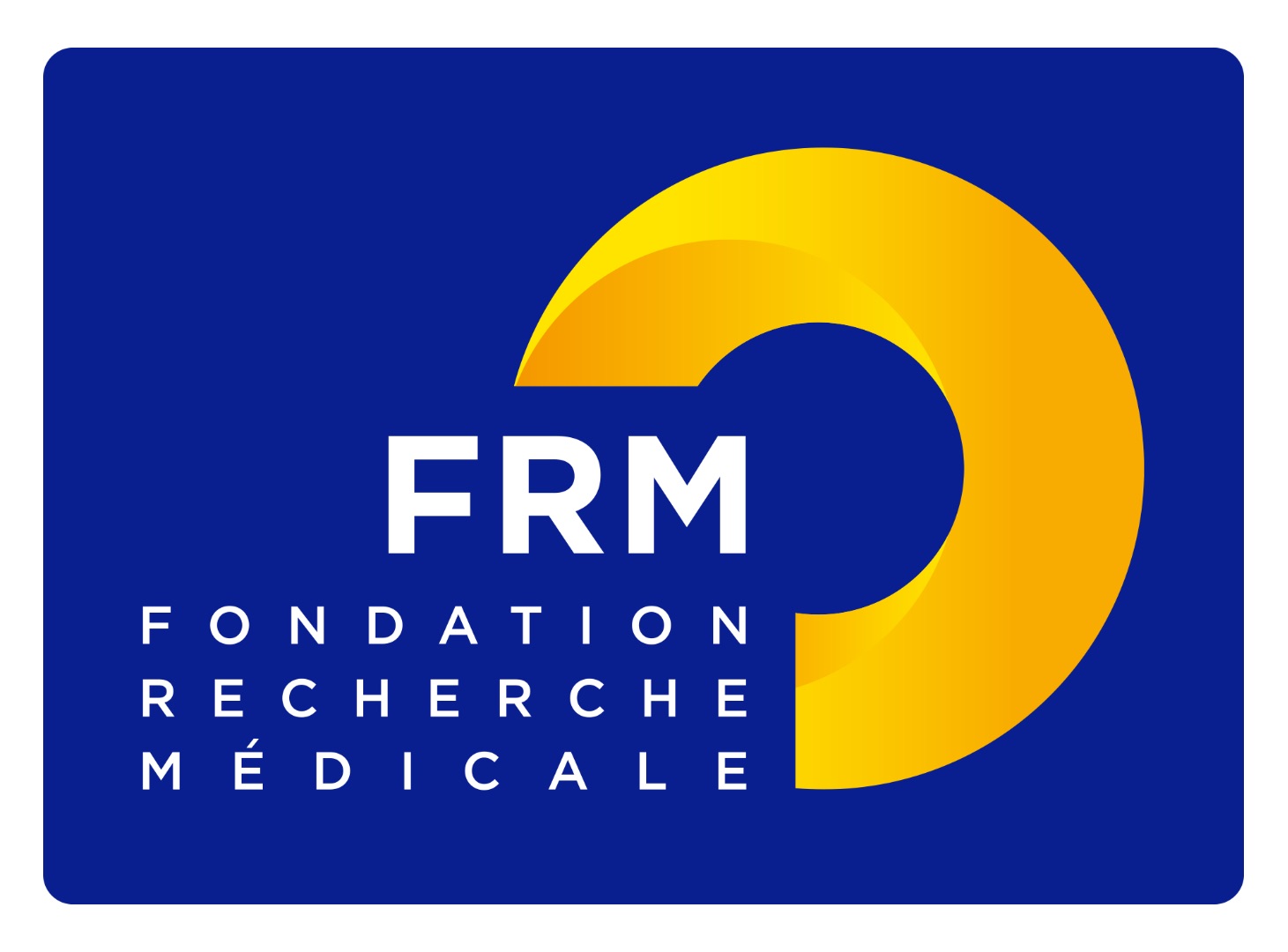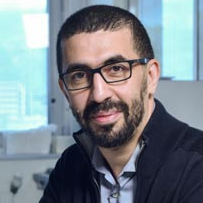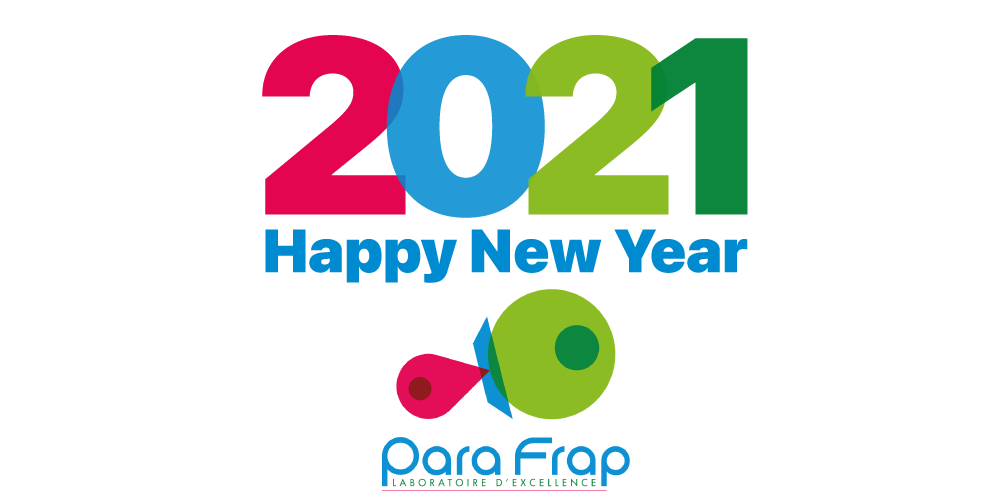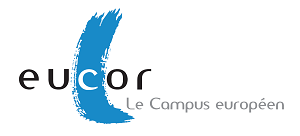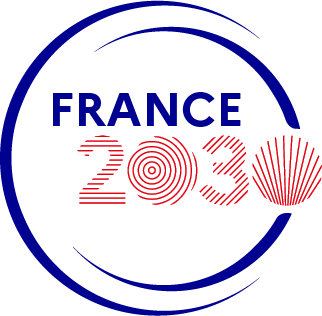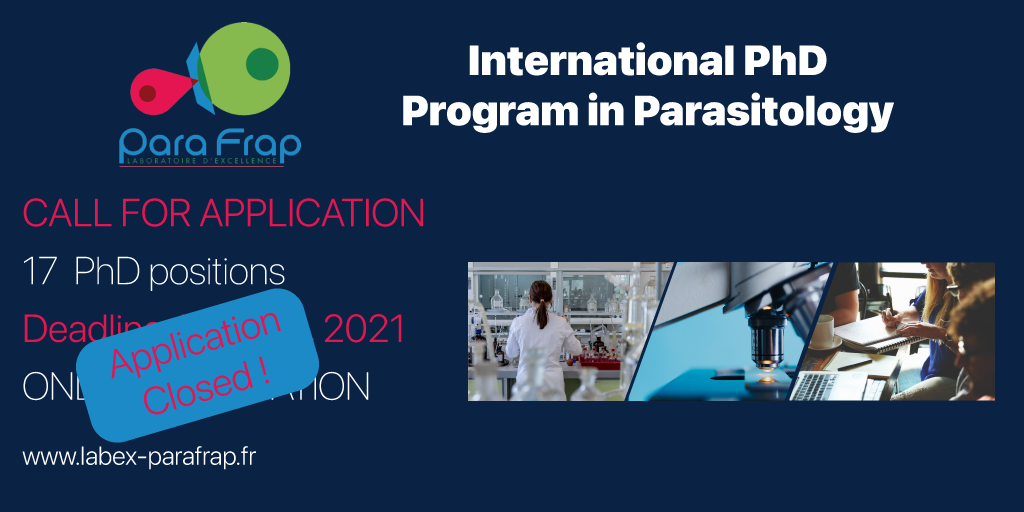
|
The notifications about invitations will only be sent on Tuesday 11th May afternoon (French time). The international PhD program of the French national research project 'ParaFrap' is currently open for applications for 17 Ph.D. positions to be started in October 2021. PRESENTATION The LabEx (Laboratory of Excellence) ParaFrap is a Health Sciences collaborative research program focusing on Molecular and Cellular Parasitology in its wider sense. The network gathers 26 French leading groups in the field and is funded by the Excellence Initiative of the French Ministry of Research. Four major research fields are investigated in protozoan models such as Plasmodium, Toxoplasma, Leishmania, Trypanosoma and Cryptosporidium: Ø Post-genomic data exploration
The ParaFrap International Ph.D. program is an ambitious program offering competitive Ph.D. grants to high-quality students/early stage scientists. Applications are open to non-French students. The early stage scientists will be joining research projects selected by an external scientific board and managed by a main supervisor and a co-supervisor from two distinct research groups of the LabEx. These core research projects will focus on the use of state-of-the-art post-genomic tools to enhance knowledge of the parasites' biology and of their interactions with their hosts. We are committed to providing ParaFrap Ph.D. students with the best starting platform for a successful career in science. Additional information about ParaFrap can be found on http://www.labex-parafrap.fr/en/. |
|
APPLICATION Eligibility requirements 1. Applicants must have achieved academic excellence and be highly motivated to pursue a Ph.D. project in Parasitology. They should have obtained a 'Masters 2' degree or an equivalent (5 years after high/secondary school) in science by July 2021; out of this format, only exceptional applications (upon justification) will be considered by the program director. 2. English language skills are mandatory. 3. The PhD program does not have an age restriction, but most accepted candidates are 24-26 years old and start their Ph.D. within a year of finishing their M.Sc., a few of them within 3 years. 4. Mobility between the Master's lab and the Ph.D. host lab is mandatory, meaning that the applicants must change from their present Research Director and Institute to another for the Ph. D. training. Deadline The deadline for submitting an application is on the 10th April 2021. PhD research projects
Information about the PhD research projects, selection process, as well as the application procedure, is available at https://parafrap.application.systems. All applications MUST be made online on this website. Successful applicants will be enrolled in one of the 17 research groups who were awarded a Ph.D. fellowship, distributed among diverse French Universities (see website). Each applicant will have to indicate 4 projects of interest. If selected, he/she should be enrolled in one of the four projects indicated, unless the selection committee sees a particular interest in modifying one of his/her options. |
|
SELECTION PROCEDURE • Pre-selection: Applicants will be selected by a committee formed by group leaders of each of the participating laboratories, based on the high standards used at EMBL, including academic achievements, previous experience in research, and (blind) letters of recommendation. Each PI will rank five applicants according to his/her CV, academic records, laboratory experience and letters of recommendation from referees. • Interviews: The ParaFrap selection committee will then invite a shortlist of 35-40 candidates for the final selection round, i.e. interviews in front of the whole panel of PIs of the programme. These interviews will take place between June 15th and June 23rd at Institut Pasteur in Paris or remotely by video, depending on the pandemic situation. If on site, travel and accommodation expenses will be covered by ParaFrap. • Final selection: After ranking by the selection committee, letters of acceptance will be sent immediately to the top 17 candidates, who will be asked to give their approval in the following week. The remaining candidates will be informed of their ranking. Should a candidate refuse the offer, the first candidate in the waiting list will receive a letter of acceptance. SUPERVISION OF THE PhD THESIS WORK The PhD. student will be supervised by his/her thesis supervisor and the main collaborator (‘co-PI’) in the project, who has to be from another institute. A Ph.D. thesis committee will interview the student at the end of the 1st and 2nd year and produce a mid-report to the Doctoral School of the University. THESIS CONTRACT • Duration: The selected Ph.D. students will be recruited on a fixed-term contract of 36 months. • Studentship: The maximum gross monthly salary will be 2500 €, depending on the Research Institutions. The Ph.D. students will receive private health insurance and social security entitlements. |
PhD Program provisional planning
| April 10th, 2021 | Application deadline |
| April 15th, 2021 | Referees deadline (blind letters of recommendation) |
| May 11th 2021 | Invitations for interviews sent to applicants |
| June 21st-23rd, 2021 | Interviews and notification of the results |
| June 30th, 2021 | Definitive acceptance by the selected applicants |
| September 1st, 2021 | Start of the Ph.D. |
